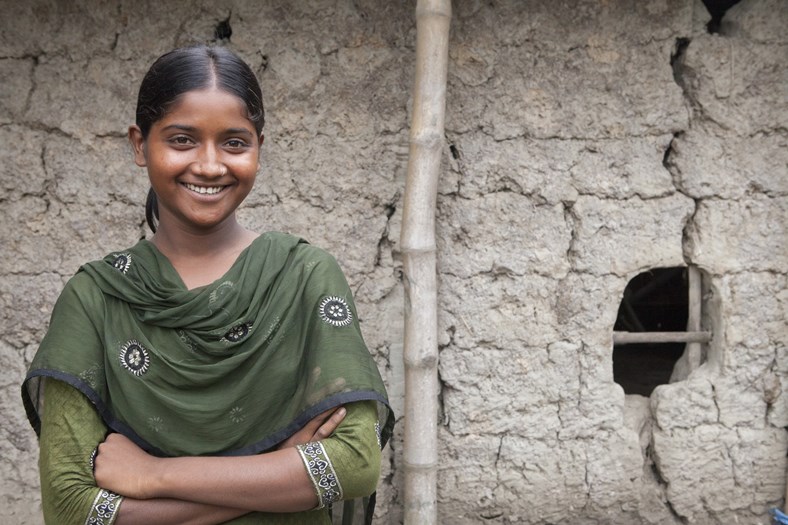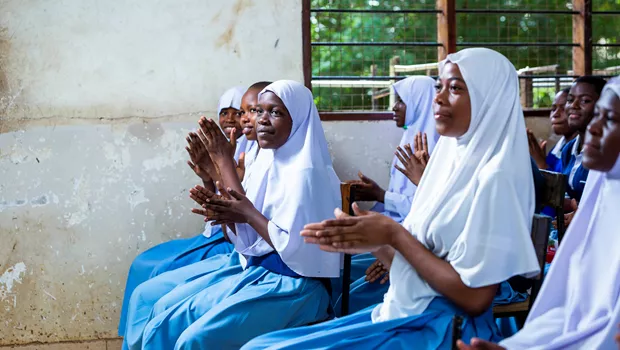Although Mili loved school, she didn’t expect to continue past the 8th grade.
In her remote village of Khaichala, Bangladesh, girls almost never continue to study after primary school. Families in her village, among the poorest in Bangladesh, often feel that they cannot afford to let their daughters continue schooling when all hands are needed to feed the family.
Mili’s situation isn’t uncommon. In many places, family and cultural issues often prevent girls from continuing their education. Formal education is often seen as a boy’s role, while girls are expected to stay home to care for siblings and elders and earn marginal wages to help support their families.
Even in families where girls’ education is valued, when hard times happen, sending daughters to school can seem less-vital than keeping them home to help the family stay afloat. Such was the case for Mili.
Mili’s father worked tirelessly from dawn until dusk as a day laborer in the fields to support his family. However, the harsh and relentless labor took its toll on his body and he became too ill to work.
As just a 9th grader, Mili took on the additional responsibility of helping support her family, attending school in the morning and laboring in the fields from Noon until nightfall. Ninth grade is a particularly critical school year for Bangladeshi students. This is the year the Secondary School Certificate (SSC) exam is administered.
Considered a “life-defining” exam, it’s the first major standardized exam a student encounters and it determines who will advance and continue their education.
Those who do not pass these so-called “gateway exams” must wait a full year before re-taking them, and there are rarely remediation processes in place to help students prepare and improve. Compounding this issue is the fact that many of these students could be years behind in their learning, thanks to educational systems that advance students into the next grade regardless of whether or not they have acquired the fundamentals needed.
Many girls, like Mili, are particularly at risk to fail gateway exams when family or cultural issues compete with school attendance and exam prep.
Room to Read social mobilizers, local women hired as mentors to at-risk girls, use targeted, holistic interventions to help girls stay in school and pass these gateway exams. “I must say I am so lucky to have gotten support from Room to Read at that time,” she says.
In addition to serving as examples of educated, strong women in the community, social mobilizers provide girls with emotional support and guidance to help them along their journey through completion of secondary school. When exam time comes, social mobilizers provide additional focus on study habits, how to prepare for an exam and how to cope with the stress that the test brings. For Mili, this meant she was also able to attend weekend Learning Camps, where she received special tutoring in Mathematics, English, and General Science.
Mili’s social mobilizer, Moli Apa, recognized Mili’s struggles and made a point of visiting her almost daily to offer her support.
 “After school, I worked in the field until the evening,” says Mili. “Moli Apa came to me almost every day to get an update on my progress in school and to inspire me to continue. Although exhausted after a long day’s hard work, her visits always motivated me to keep studying at night.”
“After school, I worked in the field until the evening,” says Mili. “Moli Apa came to me almost every day to get an update on my progress in school and to inspire me to continue. Although exhausted after a long day’s hard work, her visits always motivated me to keep studying at night.”
However, no amount of motivation and encouragement can restore a body physically exhausted from long days filled with manual labor. Days before the Secondary School Certificate exam, Mili fell ill. It was Moli Apa, her social mobilizer, who rushed her to the hospital to receive immediate care. With Moli’s support and Mili’s determination intact, Mili soon returned from the hospital in time to sit for the exam.
Room to Read and Moli Apa also worked with the local community to help pay for Mili’s exam registration fees, a new school uniform, calculator and other necessary materials.
Thanks to a network of caring people supporting her, Mili overcame seemingly impossible barriers to her success and passed the Secondary School Certificate exam.
Having passed this crucial milestone, Mili is now continuing her higher secondary studies at a school close to home. Her next goal is to complete her education and graduate to become a teacher.
Learn more about our Girls’ Education Program and our work in Bangladesh.




